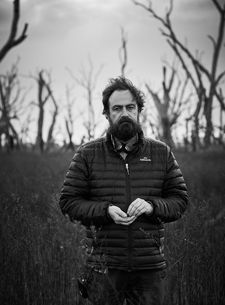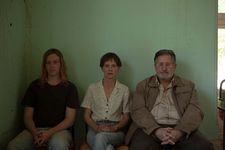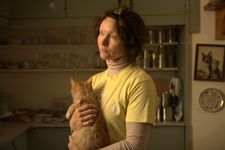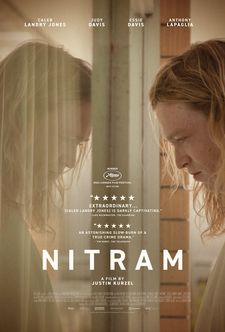 |
| Nitram |
The subject of violence is a thematic thread that runs through Australian director Justin Kurzel's work. His debut feature, Snowtown, based on Debi Marshall's book, Killing For Pleasure, explores the real life events in which a 16-year-old was indoctrinated into a culture of torture and murder by his mother's new boyfriend. He followed this with an adaptation of Shakespeare's Macbeth, before redirecting his gaze to the story of a gang of violent outlaws in 1870s Australia, in True History Of The Kelly Gang. His fifth feature, Nitram, adapted from a screenplay by Snowtown co-writer Shaun Grant, continues this trend, exploring the man and events that led to the 1996 mass shooting in Port Arthur, Australia.
 |
| Justin Kurzel |
In conversation with Eye For Film, Kurzel discussed the inevitable challenges of directing a film that some people did not want to be made, while for a younger generation, it confronts some of their questions. The director also spoke about the place of art in being a means to safely confront difficult subjects.
Paul Risker: Nitram is a difficult film to discuss because it remains a sensitive subject. A fitting way to begin is to ask what motivated your decision to direct this film?
Justin Kurzel: It’s a taboo subject, in that when the event happened there was a shift in Australia, and Tasmania was definitely never the same again. We all know where we were when we discovered what was happening. I now live in Tasmania; my wife's Tasmanian, and so I felt the change in a personal way.
I don't think I've ever had conversations about the events and looked into them. It was always a dark shadow that I never wanted to look into, but Shaun Grant, sent me a spec script out of the blue.
It was Covid and a lot of the projects that he and I had fell through. He just started writing, and a lot of it came from a couple of close calls he’d had with some shootings in Los Angeles, where he was living at the time. He wanted to write a film about gun reform, and he suddenly felt he had a point-of-view in the events of Port Arthur, that he could work out in the screenplay.
I started reading it and from the first page I said, “I'm not doing this film.” As I read it and got to know this family, I suddenly felt this world was familiar and recognisable. Then this Helen character came into it, and I was becoming intrigued by a group of characters I felt as though I'd known before. By the time the character became more isolated and he walked into the gun store, I felt the absurdity of someone in that isolated space being able to buy semi-automatics like they were golf clubs.
 |
| Caleb Landry Jones as Nitram, with Judy Davis and Anthony LaPaglia, who play his parents |
It was this that grabbed me straight away, but then the whole conversation began about outliers and the way we look after each other as a community. How do people fall between the cracks like this, and is there anything we can do, or anything that we can see?
… When we shot it, for the first two or three weeks it felt like a family drama about parenting. It was interesting how the shape of the film evolved from Shaun's initial impulse, which was: I've got to write a film about gun reform, and I’ve got to do it through this event.
PR: The story is told in a way that explores how one family’s personal dysfunction, becomes a black hole that pulls a community into its path.
JK: I was moved by the story of the mother's point-of-view, and what is it to be a parent to a child like that. At the age of twenty-six they're still living at home and you’re still having to clean up their mess - the fatigue of it. Judy Davis brought a lot to that point-of-view and I was surprised how much I was thinking about being a father throughout filming this. I was surprised because I thought my focus would be on what it is to become isolated and what it is to be an outlier - the mind of this person. But I spent time thinking about what would it be like to be the guardian of someone like this?
PR: I don't condone these events, and it’s uncomfortable to ask this type of question, but are we doing enough to understand what motivates these acts of violence? We live in an adversarial cultural, political and economic world, that even bleeds into our moral perspective. Nitram is trying to open up this dialogue, but are we ready to have this conversation?
 |
| Essie Davis as Helen |
JK: Even by putting the spotlight on a person like this, and starting to question why and how someone makes these horrific choices, you're giving too much oxygen to that person. I suppose to actually use it as an opportunity to investigate how someone gets to a place where they do something this horrific and tragic is hard.
… I've had conversations with people who are very close to the events, who just wish the film hadn’t been made, and I appreciate that. It’s very difficult to look at these events and try to understand the family behind it, the people around him, why and how he felt invisible? And why did they move towards this ending that happens in the film?
To have a conversation about it is hard and just by making the film we've experienced that. Are we able to make films and have conversations about these sorts of events, or people? There are some who think you can't and by making the film I discovered there are others that want to know, and are asking why something like this happened in their backyard? Especially the young people who went to see it here in Tasmania. For them it was about understanding an event they hadn't felt comfortable talking about, because the generation before them had not wanted to talk about it. It's complicated and it has been difficult to navigate because there are very strong feelings about the film, especially here in Australia.
I believe the great thing about art and the space of film, is it has the ability to discuss the most difficult things - hopefully in a safe and sophisticated way, where we can start to feel like we can talk about it.
 |
| Nitram poster |
PR: If we are struggling to have this conversation, and build a support structure for those struggling with their mental health, then we need art to be confrontational. Why do you believe art can confront in a safe and sophisticated way?
JK: The scene Shaun had written when Nitram buys the guns, said so much more to me than any debate about gun reform. There’s something about the amazing thing a film can do, by bringing you into a point-of-view and immersing you in a scene. When I read that, I felt why gun reform is important, and when we were shooting it on the day, I felt it.
There's something about living in someone’s shoes. You’re backed into it with them, and you start to see and feel them dismantle and unpeel. When they're at their most dangerous, they walk into the shop with a bag of money and buy guns like they're buying candy. He doesn’t need to register it, he doesn’t need a license, and he walks out of that shop with a bag full of guns that you wouldn't see on a military field. It was that scene that made me feel more than anything else the absolute absurdity of weak gun reform.
What film can do is put you inside the point-of-view, inside a scene, and make you feel rather than try to appeal to your intellect. It's about appealing to this feeling of this is wrong, this is absurd.
Nitram was released in US theatres, on Digital Rental and AMC+ on March 30, 2022.





















